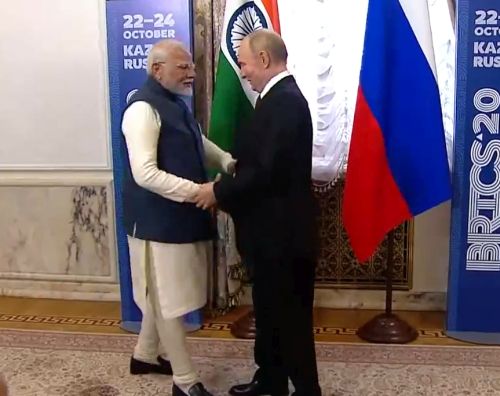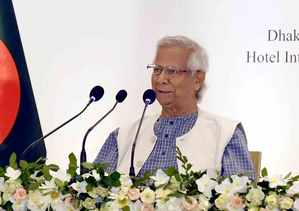International
The Third Eye: Multilateralism as a foreign policy plank
New Delhi: There is a lot of discussion among strategic thinkers on the scope of multilateralism in today’s geopolitics that was impacted by two military clashes of global implications — the 30-month-old Ukraine-Russia armed conflict and the Israel-Hamas confrontation that began last year following an audacious terror attack by the Palestinian outfit on Israel on October 7.
It goes to the credit of India’s foreign policy that it has envisaged multilateral friendships for handling the challenge of international relations in an era where signs of revival of the Cold War between the US-led West on one hand and the China-Russia combine on the other, were already seen on the horizon.
Foreign policy is a product of national security and economic concerns and India has negotiated its dealings with the rest of the world in a manner that served the former’s national interests without getting India to ‘align’ itself with any world player.
India has managed to emerge as a major power that promotes sanity in the world and represents the voice of reason and peace in international conflicts. While security interests were always paramount, the economic scene in the world that presently did not have the overriding strength of any particular single power, provided India with the opportunity of seeking relationships on the primacy of economic considerations as well.
India’s approach to multilateralism is primarily the offshoot of its policy of developing bilateral friendships based on mutual security and economic interests — in that order — and ensuring that this applied to group friendships, too, without prejudice to the cause of world peace and human advancement.
Multilateralism appropriately became a foreign policy plank for India at a time when the United Nations, the global body charged with the responsibility of resolving international conflicts, was falling short of the expectations of the peace-loving people of the world.
This was mainly because of its indecisiveness in the face of divided opinions being expressed in a polarised world.
The most prominent multilateral association for India presently is Quad — led by the US and including Japan and Australia — which conducted even military exercises but essentially presented a defensive response to Chinese aggressive moves in the South China Sea.
The mission of Quad was to ensure that a ‘rules-based order’ prevailed in the Indo-Pacific.
India has activated its participation in this forum to protect its security interests and treat it as a perimeter defence against any Chinese attempt at encroachment in the Indian Ocean itself.
India’s membership in other multilateral organisations like SAARC, SCO and BRICS is primarily used by this country as the platform for highlighting the global commons such as the threat of terrorism, the problem of human trafficking and the spread of ‘radicalisation’.
Bilateral relations within the ambit of global peace have enabled India to push up its strategic partnership with the US, deepen its defence bonds with Russia and take an independent-sounding stand on Ukraine-Russia military confrontation and Israel-Hamas armed conflict.
India has called for the suspension of hostility and the start of dialogue for a peaceful resolution in both cases.
India’s success in enlarging the ambit of bilateral relations to cover multilateral platforms is to be particularly appreciated since it had the effect of mitigating to an extent the fallout of a possible return of the Cold War.
The policy of maintaining bilateral and multilateral relationships is in keeping with India’s belief in a multipolar world order in the post-Cold War era.
India aspires to be an important flag point in this order in terms of its contribution to the global economy, supply chains and skilled workforce.
The Prime Minister Narendra Modi-led government has given special attention to the ‘ease of doing business’, tried to improve exports, including the export of military equipment, and thought of ways and means of utilising our demographic dividend.
Notwithstanding the hostile conduct of Pakistan as a neighbour and the ISI’s manoeuvring of the Islamic Emirate of Afghanistan at Kabul, India has actively pursued the idea of building special relationships with our other neighbours and strengthened the ‘Act East’ Policy that had an important bearing on the country’s neighbourhood.
The bilateral relationship may be extended to granting MFN status to each other in terms of customs and trade tariffs.
It does not suit a rising power like India to let geopolitics move in the direction of a bipolar world order again as this would tend to weaken the position of all other countries and would increase their dependence on two ‘Super Powers’.
India has to watch out for the determined effort China under the presidentship of Xi Jinping, was making to become the second superpower after the US through the economic and technology route.
India’s bid to become the third largest economy in the world is the right course for placing the country in a situation where it would be able to handle international relations according to its national interests.
Emphasis on nationalism helps a democratic state to strengthen itself internally and project the country’s identity before the world outside.
Nationalism has secularism built into the governance in a democracy that rested on ‘one man one vote’ and did not allow any denominational stamp to be put on the way the country was administered — despite the ‘majority-minority’ distribution of the population.
Nationalism prevails over party politics and the divides of caste, community and region and needs to be fostered for the sake of national unity and integrity.
The Constitution of India defines both Fundamental Rights and Duties and enjoins on citizens the duty of promoting patriotism. Nationalism should not however become a reason for flaunting ‘superiority’ over other nations — nor should it tend to curtail the ideological freedom, exercise of personal choices or expression of criticism of the government of the day, at home.
Culture is an outcome of religion and since all religions define the relationship between an individual and his or her God, it is expected that culture will unite rather than divide people.
In any case, the national culture of a united nation was rooted in a vision shared by the people, the confidence of the citizens that everybody had the same opportunities and a consensus among them on who the country’s friends and enemies were.
Nationalism is strong when the people have a shared sense of past, present and future.
The Preamble of the Indian Constitution calls upon all of its people to maintain the unity and integrity of the nation while the Directive Principles contained therein ask India to promote international peace and security, work for the maintenance of just relations between nations and encourage settlement of international disputes.
The strategic culture of the nation, the sense of nationalism and the international profile of India are all well-defined enough to justify India’s call for ‘one earth one family’ during the hosting of the G20 Conference in 2023.
Multilateralism is opted for by India in this spirit and so long as it was not ‘against’ any quarters, this was one way of promoting ‘just and honourable’ relations internationally.
It signifies ‘positive non-alignment’ in the post-Cold War world.
A nationalist India has to be a secure and economically self-dependent country holding a commanding position in the comity of nations, discharging its national and international obligations and strengthening the hands of the UN as well.
In a multipolar world order bilateral and multilateral relationships would best serve India’s interests and also give this country the satisfaction of doing good to humanity at large by pushing back the geopolitical trends that paved the way for the return of a new Cold War.
(The writer is a former Director of the Intelligence Bureau. Views are personal)
–IANS
dcpathak/khz
International
Lee Hsien Yang seeks refuge in United Kingdom

Lee Hsien Yang, the youngest son of Singapore’s founding father, the late Lee Kuan Yew, announced on Tuesday that he is now a political refugee in the United Kingdom after seeking asylum from the British government “as a last resort.”
“I remain a Singapore citizen and hope that someday it will be safe to return home,” Lee stated in a Facebook post, as reported by Channel News Asia (CNA).
Citing what he described as the Singapore government’s “attacks” against him, Lee, who is the younger brother of former Prime Minister Lee Hsien Loong, revealed that he sought asylum protection in 2022.
Lee Hsien Yang and his late sister, Lee Wei Ling, who passed away earlier this month, have been in conflict with their brother Lee Hsien Loong over the fate of their father’s home following his death in 2015, resulting in a public dispute that has estranged the siblings.
In an interview with the UK-based newspaper The Guardian, Lee alleged that a “campaign of persecution” compelled him to seek asylum in Britain.
In response to his claims, the Singapore government stated that there is “no basis” for his allegations of “a campaign of persecution” or other assertions regarding political repression in the country.
“Singapore’s judiciary is impartial and makes decisions independently. This is why Singaporeans have a high level of trust in the judiciary,” a government spokesperson remarked.
The spokesperson added that there are no legal restrictions preventing Lee and his wife, lawyer Lee Suet Fern, from returning to Singapore. “They are and have always been free to return to Singapore,” the spokesperson said.
Lee and his wife have been outside of Singapore since 2022, having opted not to attend a scheduled police interview regarding potential offenses related to providing false evidence in judicial proceedings concerning their father’s will and the family home.
Lee and his late sister, who had been living at the property, alleged they felt threatened while trying to fulfill their father’s wish to demolish the house. They also accused their elder brother, former Prime Minister Lee Hsien Loong, of abusing his governmental influence to advance his personal agenda.
International
Indo-Russian ties are stronger than ever before at BRICS

Kazan, Russia: Prime Minister Narendra Modi held a bilateral meeting with Russian President Vladimir Putin on the sidelines of the 16th BRICS Summit.
During the meeting, President Putin remarked, “I recall our meeting in July, where we had productive discussions on various issues. We’ve also spoken over the phone several times. I am very grateful you accepted the invitation to come to Kazan. Today, we will attend the BRICS Summit’s opening ceremony, followed by dinner.”
PM Modi responded by expressing his appreciation, saying, “I sincerely thank you for your friendship, warm welcome, and hospitality. It’s a great pleasure to visit such a beautiful city as Kazan for the BRICS Summit. India shares deep historical ties with this city, and the opening of our new embassy here will further strengthen these connections.”
International
Laos seeks to enhance nutrition amid climate change concerns

Vientiane (Laos), Aug 22 (IANS) Representatives from the Lao government and development partners have attended a conference here titled “Climate Change and Nutrition in Laos: Intersections and Interventions” to discuss the impact of climate change on nutrition in the Southeast Asia country and potential solutions.
Speaking at the conference, deputy director general of the Department of Hygiene and Health Promotion under the Lao Ministry of Health Viengkhan Phixay, said, “We gather to address a critical and interwoven issue: the impact of climate change on nutrition and how we can work together to tackle these challenges,” Xinhua news agency reported.
The Lao government is actively engaged in this endeavor, with numerous policies and initiatives aimed at addressing both climate change and nutrition, Lao National Television reported on Thursday.
“By leveraging the Scaling Up Nutrition network in Laos, which is led by the government, and supported by civil society, donors, and the United Nations, we have a robust platform to tackle the negative impacts of climate change while improving nutrition and overall health for everyone in Laos,” Viengkham said at the conference held on Monday.
The conference featured a series of presentations that not only detailed evidence-based research but also introduced innovative tools for measuring and enhancing nutrition under the impact of climate change.
The conference stressed the critical need for integrated approaches to tackle the intertwined challenges of climate change and nutrition, and setting the stage for impactful future collaborations.
–IANS
int/psd
International
One killed, seven injured in shootout in Iraq

Baghdad, Aug 22 (IANS) A civilian was killed while seven others were injured on Thursday in a tribal shootout in Iraq’s holy Shiite province of Najaf, according to a local security source.
The shootout erupted in the early hours between armed men from the local tribe in the al-Zarga area in northern Najaf, some 160 km south of Baghdad, a local police officer told Xinhua on condition of anonymity.
The clash resulted in the killing of an Iraqi civilian and the injury of seven others, including three Iranian Shiite pilgrims, the source added.
A joint force from the Interior Ministry’s emergency response division and Najaf provincial police arrested 53 gunmen from both sides of the shootout and seized weapons and ammunition, the Interior Ministry said in a statement.
It added that search operations are ongoing to locate additional gunmen and weapons, with more details to be released later.
The incident took place as numerous pilgrims traveled to the city of Karbala to observe Arbaeen, which marks the end of a 40-day mourning period for the killing of Imam Hussein, the grandson of Prophet Muhammad, in the Battle of Karbala in 680 A.D.
Typically, these pilgrims also visit Najaf as part of their journey to Karbala.
–IANS
int/jk/arm
International
Bangladesh seeks $1 billion budget support from World Bank

Dhaka, Aug 22 (IANS) Bangladesh’s interim government has sought $1 billion from the World Bank as budgetary support.
The call came from the country’s Power, Energy and Mineral Resources Adviser Muhammad Fouzul Kabir Khan’s meeting with Abdoulaye Seck, the World Bank’s Country Director for Bangladesh and Bhutan, in Dhaka on Wednesday.
He made the plea as the ministry owes more than 2 billion dollars to suppliers in import costs of power and energy, Xinhua news agency reported.
Khan mentioned that the interim government, which was formed with many pressing mandates, is due to settle a $2 billion debt left by the previous government in the power sector.
He said they have already suspended activities under the much-criticized Quick Enhancement of Electricity and Energy Supply Act 2010 and abolished the government’s power to set energy prices without any public hearing.
On August 5, the former Prime Minister of Bangladesh, Sheikh Hasina, was ousted from her country and power, ending her rule since January 2009.
This event was seen as a massive escalation, with what initially started as student’s protests and resulted in a major crisis in Bangladesh.
Earlier on August 8, Nobel laureate Muhammad Yunus took oath as the head of Bangladesh’s interim government.
–IANS
int/jk/as
-
Video2 years ago
PM Modi Attacks Congress in Karnataka with “Kerala Story”
-
Politics2 years ago
Siddaramaiah & DK Shivakumar sworn in as Chief Minister & Deputy CM respectively
-
Cricket2 years ago
CSK players rejoice 5th IPL title with their families (Pics)
-
Entertainment2 years ago
Karan Deol weds his longtime Girlfriend Drisha Acharya (Pics)
-
Sports7 years ago
History Of Official FIFA WORLD CUP Match balls
-
India2 years ago
Ashwini Vaishnaw: Railway Board recommends CBI probe in the Odisha railway disaster
-
Entertainment2 years ago
Urvashi Rautela dazzles on Cannes 2023 red carpet (Pics)
-
Entertainment2 years ago
Sunny Leone gets ready for Kennedy premiere in Cannes (Pics)





























